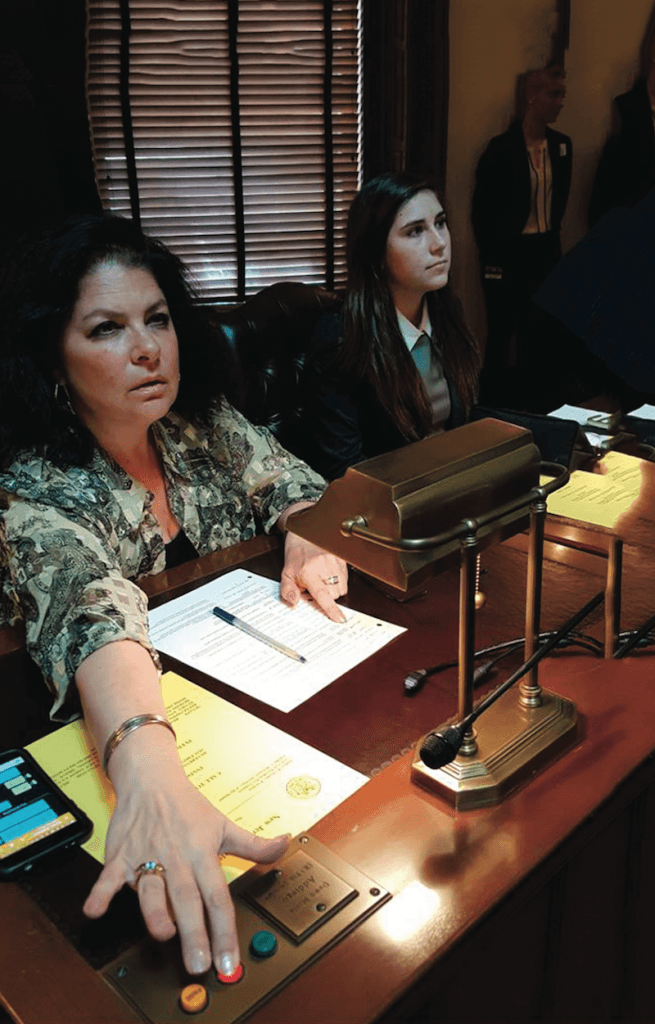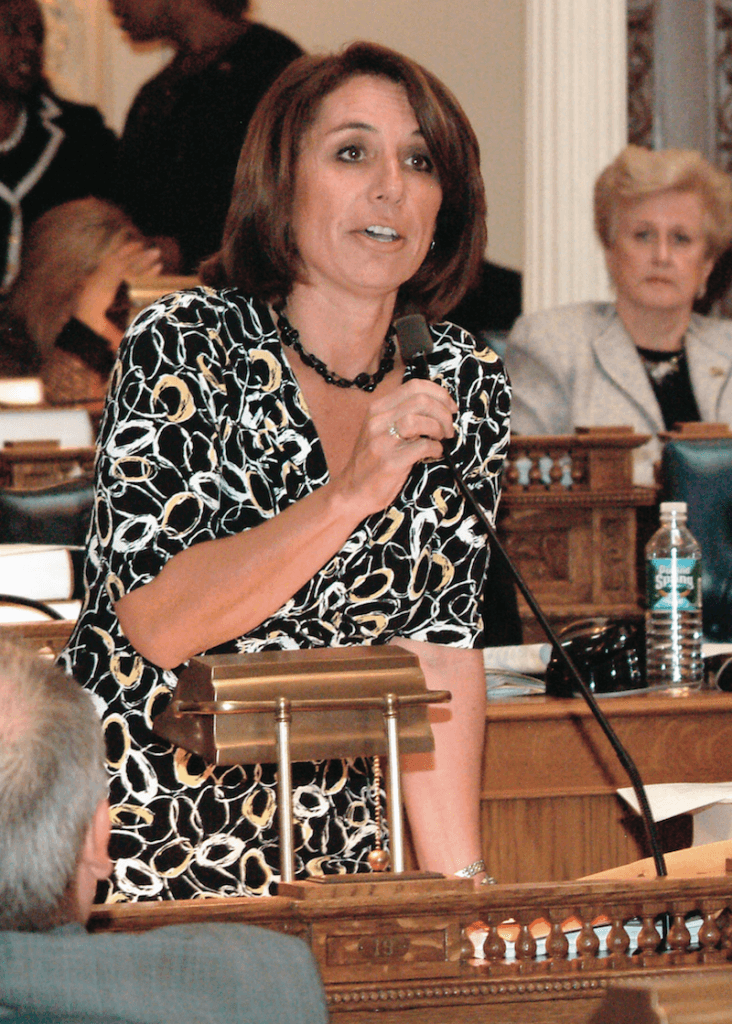In response to today’s political climate, many women are taking a closer look at running for office. There’s much to know – and even more to do – if you want to be seriously considered as a political candidate. Take a look.

State Sen. Dawn Addiego has served in the senate for seven years.
Start at the very, very beginning
Waking up one day and deciding to run for Congress might make a good story if you succeed, but chances are, you won’t. The first step is building support and getting involved in your community.
“There’s a lot you have to know about how everything works first, so you have a better understanding of what you’re doing,” says Assemblywoman Pamela Lampitt (D-Dist. 6).
“The best place to start is your own community, like your kids’ school or the zoning board. Sure, it can be intimidating to walk into a room full of strangers and say, ‘How do I get involved?’ but you’ll be surprised how many people are willing to embrace newcomers. All you have to do is knock on the door. Somebody will answer.”
Ask friends, family members or neighbors who you should talk to. “When I got started, my friends hooked me up with the county chairman,” says N.J. State Senator Dawn Addiego (R-Dist. 8). “Next thing you know, he’s introducing me to the Republican Party in Evesham and all of a sudden, I’m running. You can’t be afraid to ap-proach people and ask what you can do.”
Additionally, being on the inside of another campaign can help you get involved and figure out what’s required, Addiego adds.
“Help somebody else get elected,” she says. “Go door to door, help with surveying. It’s during that process that you start meeting people and you start the conversation about the fact that you want to run, too. You have to let people know you’re interested. They can’t help unless you tell them.”
Don’t worry, you’re qualified
You might assume you need a law degree or maybe some Wall Street experience to run for public office, but that couldn’t be further from the truth.
“I’m a trained chef,” Lampitt says. “Really − I went to school to be a chef, and I’m a politician. I think it’s more about the character of the person, at least initially. That’s really what’s going to qualify you to run for something.”
Addiego has a more traditional background, holding both an accounting and law degree. “I think those degrees and being a professional in my community helped, but it’s not the end-all,” she says. “I’ve seen people from all walks of life in politics.”
Instead, focus on what you bring to the table – and that can vary from person to person.
“What matters is that your contribution is meaningful,” Lampitt says. “Sometimes, that means you’re bringing some kind of constituency group with you. Are you bringing the soccer people? Are you bringing all the musicians? Who are you bringing to the table that’s not already there?”
“It might seem obvious, but it’s also important to recognize and actually understand what’s important to people in the community,” says Addiego. “When I was first running, the No. 1 thing was taxes. So I really focused on what I could do that would have an impact on local taxes while still providing all the services everyone was used to. My first election was in Evesham; we were the ‘tax freeze team’. We were offering some kind of actual solution to our voters. And guess what? We won.”
Yes, you will need money – and a lot
If you want to run for office, your campaign is going to cost you. There’s no way around it. “It’s a lot of money,” Lampitt says. “A lot. It can be intimidating.”

Assemblywoman Pamela Lampitt has held her current office since 2006.
“During my first campaign in Evesham, we probably spent $15,000,” Addiego says. “I’m guessing now that could cost upwards of $50,000.”
So to pay for your campaign, you’re going to have to fundraise. And for a lot of people, that doesn’t come naturally – even for Lampitt.
“It’s the hardest part of the job for me, and it’s not for everybody,” Lampitt cautions.
“I remember feeling as though I had nothing behind me, no reason people should want to donate, other than the fact that I was councilperson and whatever merits and personal qualities they saw in me. But I had to push through that and get people interested in what I had to say. You have to be able to articulate why you’re worth it.”
For her early campaigns, Lampitt knocked on doors and asked for five dollars from each person.
“Going door to door is just part of getting out in the community and getting to know people,” Addiego adds. “It’s important, but another good tactic is trying to have fun with it. One time, I had a wine festival fundraiser and invited friends and family, which made it feel more natural and welcoming.”
Having party support can also be an important facet of fundraising, according to both politicians. “Hopefully you have a good, active party in your community,” Addiego says. “They can help introduce you to people who are interested in what you have to say and will want to support you.”
But, Addiego says, she always kept one important thing in the back of her mind when she first started fundraising: “I always say, people are willing to pay for good government. That’s what you need to represent in order to fundraise successfully.”
Get ready for the trolls
It’s going to happen. There’s no way around it. When you become a political candidate, you open yourself to criticism – and as we all know, it can get personal and ugly.
“There’s always negativity,” Lampitt says. “It’s unavoidable. And you might think it doesn’t hurt, but of course it does. I’m human, right? But you have to understand that maybe somebody is saying something like that because they’re really affected by whatever the topic at hand is. Instead of getting upset or taking it personally, you have to use questions and figure out where this anger came from. It’s very important to acknowledge why people are upset in the first place. Then you can work toward a solution.”
Sometimes, though, it’s best to just get off the Internet. “I stopped reading blogs,” Addiego says. “I got so caught up in it, because it’s very hurtful. It can be downright nasty. But then I remembered I wouldn’t be in office if people didn’t vote for me, and it’s not only people from my party who voted for me. So I made a conscious decision not to read it, and that’s done me a lot of good.”
It’s one thing when the backlash is coming at you, but that’s not always how it works – which is an important thing to keep in mind before you take the plunge. Sometimes, insults are aimed at your family, which both women agree is even harder to stomach.
“It’s not an easy thing to put yourself out there, but it’s even harder to put your family out there,” Lampitt says. “Personally, I made the decision to wait until my children were capable of having a voice and understanding what their mother was doing. Then, if somebody came up to them and said something negative, they would be able to articulate an answer and feel less personally attacked.”
Be prepared to make major sacrifices
Lampitt is quick to caution that politics is not a gig for everybody. “You really need to understand what’s involved in doing something like this before you take the first few steps,” Lampitt says. “It’s hard to put yourself out there in this way. I have given up everything in terms of extracurriculars and a lot of things I used to enjoy.”
“It’s going to impact your personal life,” Addiego says. “It’s just going to. There’s a lot of time when you have very late nights, especially if you have another job and you’re doing politics and government in addition, which many of us do. It’s a lot for one person.”
But for both women, making those sacrifices is simply part of doing the job well. “I basically work two full-time jobs,” Lampitt says. “I made this decision, so I’m not complaining, but you need to know your Friday nights will not be your own and sometimes you’ll also need to be somewhere on Saturday morning at 8 am because it’s important to the people you represent. This is a real commitment.”
Addiego struggled to find balance initially, particularly with spending time with her daughter. Her solution was to mesh family and politics. “There’s so many times you need to be out in the community, but a lot of the time, you can bring your family to that and have them be part of it. It was important to me to create that balance so I could bring my daughter to things and see her more.”
If you aren’t ready to make such a big commitment, there are other ways to get involved.
“You can still be a meaningful part of the process without giving up as much,” Lampitt says. “There are clubs and organizations and elected officials that you may be passionate about, so you can use your voice there to make the difference. Because if you’re in office, it’s not about what hours you want to work. It’s always about the hours people need you.”
Elected Women in South Jersey, 2016
Source: Rutgers Eagleton Institute of Politics















